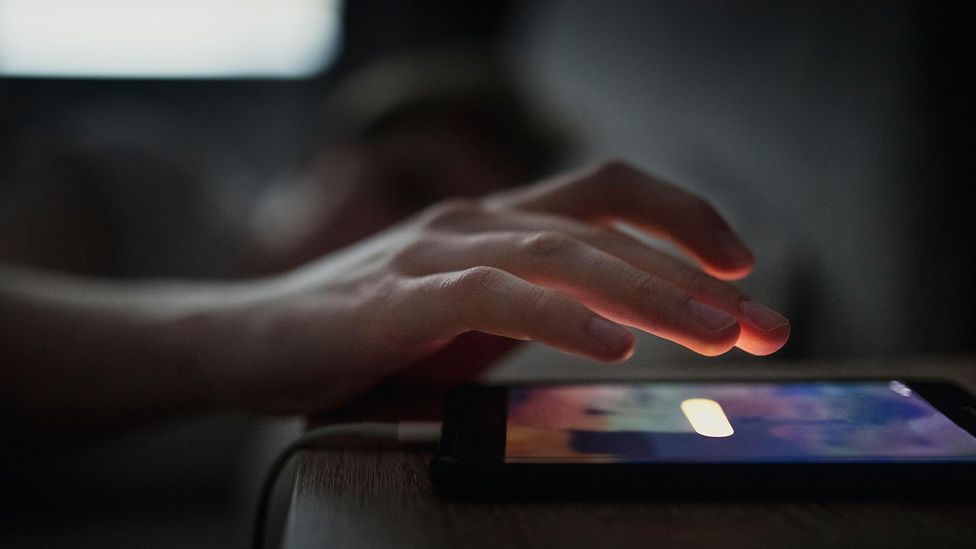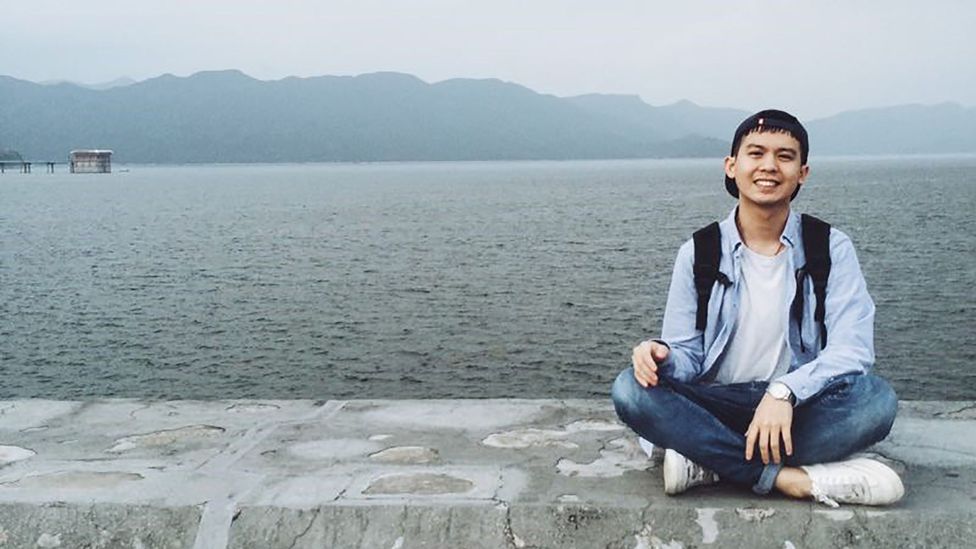I Dont Want to Go to Work Again Feels Like Its the Only Place I Have Ever Been
The psychology backside 'revenge bedtime procrastination'

Many young Chinese workers prioritise leisure fourth dimension over sleep after long piece of work days – fifty-fifty though they know information technology's unhealthy. What's driving this behaviour?
E
Emma Rao spent almost three years on China'due south notorious '996 schedule': working from nine in the morning to nine in the evening, six days a week. Rao, who is originally from Nanjing, moved to financial hub Shanghai about v years ago to work for a multinational pharmaceutical visitor. The job speedily took over her life.
"I was almost depressed," she says. "I was deprived of all my personal life." After her shift, which sometimes included overtime, she had a pocket-size window to eat, shower and go to bed – but she sacrificed sleep to eke out some personal time. Often, Rao would stay up surfing the net, reading the news and watching online videos until well after midnight.
Rao was doing what the Chinese accept chosen 'bàofùxìng áoyè' – or 'revenge bedtime procrastination'. The phrase, which could also be translated as 'retaliatory staying up tardily', spread rapidly on Twitter in June after a post by journalist Daphne M Lee. She described the phenomenon as when "people who don't have much control over their daytime life refuse to slumber early on in order to regain some sense of freedom during late-night hours".
Her post conspicuously struck a chord. In a answer 'liked' more than iv,500 times, Twitter user Kenneth Kwok tweeted: "Typical viii to 8 in office, [by the time I] go far home subsequently dinner and shower information technology'southward 10 p.m., probably won't simply go to sleep and repeat the same routine. A few hours of 'own time' is necessary to survive."
It'due south not clear exactly where this term came from. The earliest mention this reporter found was in a blog post dated November 2018, although its origins likely predate this. The post'southward writer – a man from Guangdong province – wrote that during the workday he "belonged to someone else," and that he could only "find himself" when he got home and could lie down. This revenge bedtime procrastination was sad, he wrote, because his health suffered, simply information technology was as well "great" because he got a bit of freedom.
The phrase might have been popularised in China, just the miracle information technology describes is likely widespread, with over-stretched workers all over the world putting off bedtime to merits some precious personal time – even though they know it's not good for them.

Gu Bing works a lot but sacrifices sleep for pastimes and fun: "My friends and I, we converse at nighttime and sometimes we write songs together. It'southward tranquillity and peaceful"
Blurring boundaries
Experts have long warned that insufficient sleep is an unheeded global public-health epidemic. The 2019 Phillips Global Sleep Survey, which received more than 11,000 responses from 12 countries, showed that 62% of adults worldwide feel they don't become enough slumber, averaging 6.8 hours on a weeknight compared to the recommended corporeality of viii hours. People cited various reasons for this shortfall, including stress and their sleeping environment, merely 37% blamed their hectic work or schoolhouse schedule.
In Mainland china, a national survey in 2018 showed that 60% of people born afterwards 1990 were not getting enough sleep, and that those living in the biggest cities suffered the most. The tech companies who created 996 culture tend to exist based in big cities, and their work practices have influenced other sectors. A recent report past land broadcaster CCTV and the National Bureau of Statistics said the boilerplate Chinese employee only had 2.42 hours per day when they were not at work or asleep, down by 25 minutes from the previous year.
Gu Bing, a 33-year-former creative director at a digital agency in Shanghai, often works late and considers going to sleep before 0200 an early night. "Fifty-fifty though I am tired the next day, I don't want to slumber early," she says. Gu loved belatedly nights in her 20s, simply has started to think about adopting more "normal" sleeping habits. Still her friends are oft also awake in the centre of the night. "I really need that time. I desire to be healthy just they [her employers] stole my time. I want to steal dorsum my time."
Long hours at the office bated, another function of the problem is that modern working patterns hateful people find it harder to draw boundaries between piece of work and home, says Ciara Kelly, a lecturer in work psychology at Sheffield University'due south Management Schoolhouse. Emails and instant messaging mean employers can e'er be in touch. "This can brand information technology feel more like nosotros are 'ever at work,' because piece of work can call on us at any fourth dimension," she says.
Jimmy Mo, 28, an annotator at a games development house in the southern metropolis of Guangzhou, has plant combining his passion for video games with piece of work a double-edged sword. "Work is also my hobby. I dearest to sacrifice my leisure time for this," he says, explaining that he is required to play different games after piece of work every bit well as take online classes to boost his professional skills. He also has hobbies including yoga and singing; squeezing them in means that Mo often doesn't turn in until 0200. He knows this lack of sleep is potentially exacerbating an exisiting wellness status, and that sleeping more could brand him healthier and happier, but says he feels peer pressure level to practice and accomplish more.

Jimmy Mo says he doesn't turn in until 0200 most nights, every bit he crams hobbies and online classes in after work
The sleep 'Grab-22'
Although people might resent work squeezing their leisure time, reducing sleep is probably not the best 'retaliation'. Sleep deprivation, especially long term, can pb to a host of harmful effects, both mental and concrete. In Matthew Walker's book Why We Slumber: Unlocking the Ability of Sleep and Dreams, the neuroscientist is edgeless: "The shorter your sleep, the shorter your life span." And people, in general, know this: everybody interviewed for this commodity felt their sleep patterns were unhealthy – merely they yet kept late nights.
Psychology may explain the reason why people would cull to eke out this leisure time even at the expense of sleep. A growing body of evidence points to the importance of fourth dimension away from work pressure; failure to disassemble can lead to stress, reduced wellbeing and exhaustion. "I of the most important parts of recovery from work is sleep. However, slumber is affected by how well we disassemble," says Sheffield University's Kelly. It's important, she explains, to have downtime when we can be mentally distanced from work, which would explain why people are willing to cede sleep for mail service-work leisure.
"People are stuck in a Catch-22 when they don't have time to disassemble from their piece of work earlier they go to sleep, it is probable to negatively affect their sleep," says Kelly. The real solution, she suggests, is to ensure that individuals are allowed time to engage in activities that provide this detachment. However, this is often not something employees can achieve by themselves.
Heejung Chung, a labour sociologist at the University of Kent and an advocate for greater workplace flexibility, sees the do of delaying sleep every bit the fault of employers. Tackling the problem would do good workers just besides help ensure a "healthy, efficient workplace", she points out. "It's actually a productivity mensurate," she says. "Y'all demand that fourth dimension to unwind. Workers need something to practice other than piece of work. It's risky behaviour to do only 1 affair."
Greater flexibility
Since the pandemic, companies in many nations have implemented work-from-home policies, introducing greater flexibility into working lives but besides, in some cases, further blurring already tenuous boundaries between work and home. Information technology's non still clear how this might affect the kind of work culture that leaves employees shunning sleep to claw back some free time.
Chung says that genuine alter requires an institutional shift, across many companies. "Information technology's hard for individuals to react [to their work state of affairs]," she says. Just she does suggest employees to talk to their colleagues and collectively arroyo their boss, with evidence, if they desire to ask for change.
However, this might not be forthcoming in China. In fact, reports suggest that companies are digging in even more when information technology comes to overtime as they try to bounce back from losses caused by Covid-xix. Krista Pederson, a consultant who works with multinationals and Chinese corporations from Beijing, says that she's observed this trend. Chinese companies see their working civilization as an advantage over markets like the US or Europe where people tend to work fewer hours: "They know they have hard workers who are ruthless and volition practise whatever it takes to go ahead, including working all the time," she says.
With such a demanding work culture, employees will go on on tackling the trouble in a style that works for them. Despite burning the candle at both ends, Gu Bing loves her job and embraces her stolen leisure time. "Sometimes, I really reckon night time is perfect, beautiful fifty-fifty," she says. "My friends and I, we antipodal at dark and sometimes we write songs together. It'south quiet and peaceful."
And there is the selection, for the lucky ones, of changing jobs, which is what Emma Rao did, finally swapping her 996 job for a slightly less enervating 1. However, Rao has institute that former habits are hard to shake. "Information technology is a revenge," she says of her late bedtimes. "To become back some time for yourself."
Source: https://www.bbc.com/worklife/article/20201123-the-psychology-behind-revenge-bedtime-procrastination
0 Response to "I Dont Want to Go to Work Again Feels Like Its the Only Place I Have Ever Been"
Post a Comment